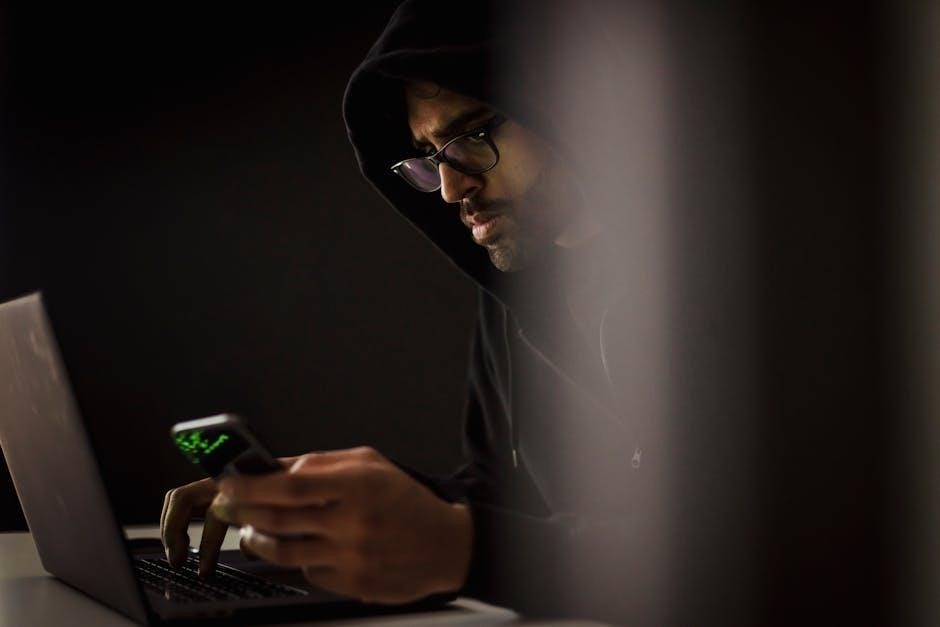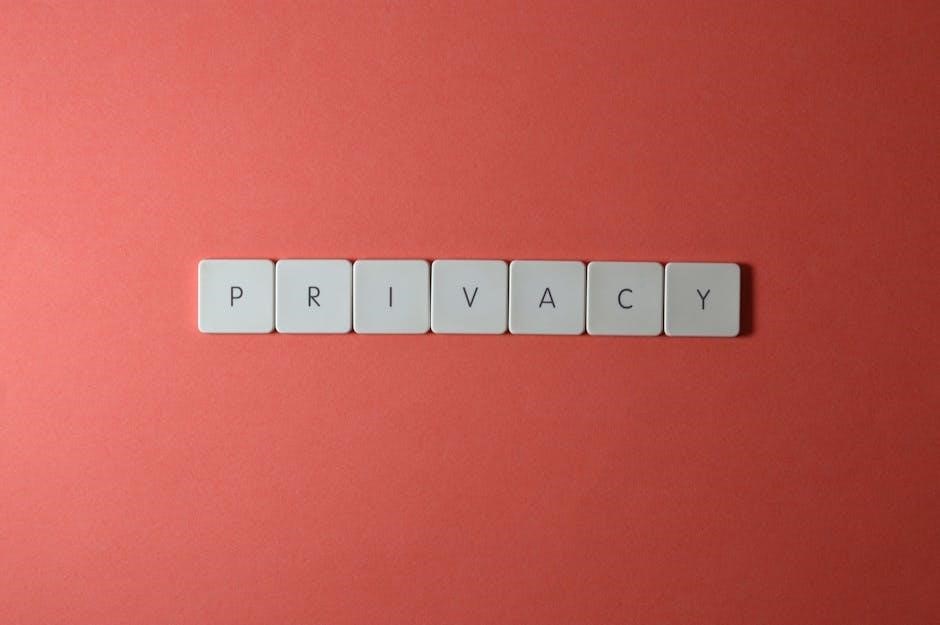cyber security quiz questions and answers pdf

Enhance your knowledge with a comprehensive cyber security quiz PDF, featuring multiple-choice questions, true/false scenarios, and detailed answers. Perfect for self-assessment, exams, or remote worker training.
Overview of Cyber Security and Its Importance
Cyber security is the practice of protecting systems, networks, and programs from digital attacks. It encompasses a broad range of topics, including network security, cryptography, and ethical hacking, to safeguard sensitive information. With the rise of cybercrime, understanding cyber security is crucial for individuals and organizations to prevent data breaches and maintain privacy. Regular quizzes on cyber security help identify knowledge gaps and reinforce best practices, ensuring a stronger defense against evolving threats. By mastering these concepts, users can better navigate the complexities of online security and protect themselves from malicious activities in an increasingly digital world.
Benefits of Using Cyber Security Quiz Questions
Cyber security quiz questions offer a dynamic way to assess knowledge and enhance awareness. They help identify gaps in understanding, allowing for targeted learning. Regular quizzes reinforce best practices, ensuring individuals and teams stay informed about the latest threats. For students and professionals, these questions are invaluable for exam preparation and interviews. Additionally, quizzes can be used to train remote workers, fostering a culture of security. By testing knowledge on topics like cyber laws and ethical hacking, quizzes promote continuous improvement and readiness in the face of evolving cyber threats.

Types of Cyber Security Quiz Questions
Cyber security quizzes include multiple-choice questions (MCQs), true/false, and scenario-based questions. These formats test knowledge on various topics like network security, cryptography, and ethical hacking effectively.
Multiple Choice Questions (MCQs) for Cyber Security
Multiple Choice Questions (MCQs) are a popular format in cyber security quizzes, offering a structured way to test knowledge. Each question presents several options, with one correct answer. MCQs cover essential topics like network security, cryptography, and ethical hacking, ensuring a broad understanding. They are ideal for self-assessment, exams, and interviews, as they simulate real-world scenarios. For example, questions might ask about phishing detection or encryption methods. MCQs help identify knowledge gaps and reinforce learning. They are also time-efficient, making them perfect for quick assessments. Regular practice with MCQs enhances problem-solving skills and prepares individuals for complex cyber security challenges.
True or False and Scenario-Based Questions
True or False questions are straightforward, testing basic knowledge on topics like phishing detection or malware types. Scenario-based questions present real-life situations, requiring critical thinking. For example, they might ask how to respond to a suspicious email or data breach. These questions evaluate practical application of security practices, ensuring users can adapt knowledge to actual threats. They are effective for assessing hands-on skills and decision-making abilities. Scenario-based questions also cover advanced topics like ethical hacking phases and darknet activities, providing a comprehensive understanding of cyber security challenges. Regular practice with these questions enhances preparedness for real-world incidents and improves overall security awareness.

Key Topics Covered in Cyber Security Quizzes
Essential topics include network security, cyber safety basics, cryptography, and cyber laws. These cover firewalls, encryption methods, online safety practices, and legal frameworks for incident response.
Network Security and Cyber Safety Basics
Network security and cyber safety basics are fundamental topics in cybersecurity quizzes. These questions cover essential concepts such as firewalls, intrusion detection systems, and encryption methods. They also address common threats like phishing, malware, and ransomware, providing practical insights into safeguarding systems. Quiz questions often test understanding of secure communication protocols, like HTTPS and SSL, and the importance of regular software updates. Additionally, they emphasize best practices for password management and safe browsing habits. These basics form the cornerstone of cybersecurity awareness, ensuring individuals can identify and mitigate risks effectively in both personal and professional environments.
Cryptography and Cyber Laws
Cryptography and cyber laws are crucial areas covered in cybersecurity quizzes. Questions on cryptography focus on encryption methods, such as AES and RSA, and their role in securing data. They also explore hashing techniques and digital signatures, which are vital for data integrity and authentication. Cyber law questions address legal frameworks governing cybercrimes, privacy, and data protection. Topics include compliance with regulations like GDPR and CCPA, as well as ethical hacking practices. These questions help participants understand the legal implications of cyber activities and the importance of adhering to security standards. They also highlight the balance between security measures and individual privacy rights in the digital age.

Advanced Cyber Security Concepts
Explore advanced topics like ethical hacking phases, deep web monitoring, and cybercrime detection. These concepts cover sophisticated threats and countermeasures, enhancing your cybersecurity expertise significantly.
Phases of Security and Ethical Hacking
Understanding the phases of security and ethical hacking is crucial for identifying vulnerabilities. The process begins with reconnaissance, where attackers gather information about the target. This is followed by scanning and enumeration, where they probe for weaknesses. The next phase involves gaining access, often through exploits or social engineering. Once inside, attackers maintain access to ensure prolonged control. Finally, they cover their tracks to avoid detection. Ethical hackers use these same phases to test systems legally, helping organizations strengthen their defenses. This knowledge is essential for any cybersecurity professional aiming to protect sensitive data and systems from malicious actors. Regular quizzes on these topics ensure proficiency and readiness.
Deep Web and Cybercrime Monitoring
The deep web, often associated with illegal activities, poses significant risks to cybersecurity. Monitoring this hidden network helps identify and mitigate threats, such as data breaches, botnets, and spam attacks. Cybercriminals use encrypted platforms to trade stolen information, making it challenging for law enforcement to track. Ethical hackers and cybersecurity experts employ advanced tools to monitor these activities, ensuring proactive measures against potential threats. Regular quizzes on deep web concepts and cybercrime tactics enhance understanding of these risks, enabling better protection of sensitive information and systems from malicious actors. Staying informed about these evolving threats is crucial for maintaining robust cybersecurity defenses in today’s digital landscape.

Practical Applications of Cyber Security Quizzes
Cybersecurity quizzes are invaluable for assessing knowledge gaps and preparing individuals for exams, interviews, and real-world threats, ensuring practical application of security concepts effectively.
Assessing Knowledge Gaps and Reinforcing Security Practices
Cybersecurity quizzes are an effective tool for identifying areas where individuals may lack understanding. By regularly testing knowledge, quizzes help pinpoint gaps and reinforce essential security practices. This approach ensures teams are well-prepared to handle real-world threats. Quizzes cover key topics like phishing, malware, and data protection, providing immediate feedback and fostering continuous learning. Organizations can use these assessments to track progress over time, ensuring a strong security posture. Regular quizzing also encourages proactive learning, reducing the risk of human error, which is a leading cause of security breaches. This method is particularly useful for remote workers who may face unique cyber threats.
Preparing for Exams, Interviews, and Online Tests
Cyber security quiz questions and answers PDFs are invaluable for exam, interview, and online test preparation. They cover a wide range of topics, including ethical hacking, cryptography, and network security, ensuring comprehensive readiness. Multiple-choice questions (MCQs) and scenario-based queries simulate real-world challenges, helping candidates refine their problem-solving skills. Practicing with these quizzes builds confidence, improves time management, and reduces exam anxiety. Additionally, they provide insights into current trends and common interview questions, enabling individuals to showcase their expertise effectively. Regular practice with these resources ensures a strong foundation in cyber security concepts, making them indispensable for professional and academic success.

Downloading and Using Cyber Security Quiz PDFs
Cyber security quiz PDFs are easily accessible and printable, offering a convenient way to assess knowledge and prepare for exams or interviews. They include MCQs, true/false questions, and detailed answers, providing a comprehensive learning tool for students and professionals. Regular use helps reinforce key concepts and ensures a strong understanding of cyber security principles. These resources are ideal for self-study, remote training, or classroom activities, making them an essential asset for anyone seeking to enhance their cyber security expertise.
How to Access and Print Cyber Security Quiz Questions
Cyber security quiz questions are readily available in PDF format online, allowing easy download and printing. Users can access these resources through various websites offering free or paid versions. Once downloaded, the PDFs can be printed for offline use, making them ideal for classrooms, workshops, or personal study. Many PDFs are organized by chapters or topics, such as network security, cryptography, and ethical hacking, ensuring focused learning. They often include answer keys, enabling self-assessment and reinforcing understanding of key concepts. Printing these quizzes allows for a hands-on approach to learning, making them a valuable tool for anyone seeking to improve their cyber security knowledge.
Using PDFs for Remote Worker Cyber Security Training
PDFs containing cyber security quiz questions are an excellent resource for remote worker training. They provide accessible and flexible learning tools that employees can complete at their convenience. With topics ranging from phishing detection to data protection, these quizzes help reinforce essential security practices. Many PDFs include answer keys and explanations, allowing remote workers to self-assess and identify knowledge gaps. Employers can easily distribute these materials via email or company portals, ensuring consistent training across teams. Regular use of these quizzes helps maintain a strong security culture, even in remote environments, and prepares employees to respond effectively to cyber threats. This approach supports ongoing professional development and compliance with security standards.

Best Practices for Cyber Security Quiz Design
Ensure questions are clear, concise, and relevant to real-world scenarios. Include a mix of difficulty levels and provide detailed explanations for answers to enhance learning and retention.
Creating Engaging and Informative Quiz Content
To create engaging quiz content, focus on real-world scenarios and current trends in cyber security. Use a mix of question types, such as multiple-choice, true/false, and scenario-based questions, to cater to different learning styles. Incorporate practical examples and case studies to make the content relatable. Ensure that each question is clear and concise, avoiding ambiguity. Provide detailed explanations for correct and incorrect answers to enhance understanding. Regularly update the content to reflect emerging threats and technologies. This approach not only educates but also keeps participants interested and motivated to learn more about cyber security.
Ensuring Relevance and Accuracy of Questions
Relevance and accuracy are crucial for effective cyber security quizzes. Regularly update questions to reflect the latest threats and technologies. Cross-verify answers with credible sources to maintain correctness. Align questions with key topics like network security, cryptography, and ethical hacking. Avoid outdated information and ensure questions are applicable to real-world scenarios. This ensures the quiz remains a valuable tool for learning and assessment. By focusing on accuracy and relevance, you create a resource that is both informative and practical for users seeking to enhance their cyber security knowledge and skills. This approach fosters trust and reliability in the quiz material.



Leave a Reply
You must be logged in to post a comment.